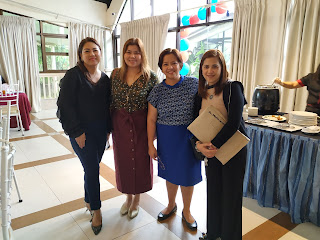It was during the Public Health Forum 2019 when I answered the question "what is your biggest regret in medical school?" with "I was not able to document my experiences in medical school..."
So here I am taking each available moment to write about things that seem important to me. Stories that keep me awake at night and stories that motivate me to wake up in the morning and keep trudging through tedious and challenging work.
Today was such a day.
I was originally expected to attend the ALARM course of POGS. However, today was the HIV ENDGAME - when the Philippine Infectious Disease Society for Obstetrics and Gynecology (PIDSOG) finalizes its position statement on the interventions for the prevention of mother to child transmission of HIV infection. There are three known modes of HIV transmission. These include unprotected penetrative sexual intercourse, transfusion of infected blood and from an infected mother to her child.
Of these three, perinatal transmission of HIV infection is easiest to address. There is poor uptake of condom use among males who have sex with males and freelance sex workers. Drug rehabilitation, needle exchange and even washing of needles have proven ineffective among injecting drug users. However, pregnancy is a condition where women generally seek consult with a physician, hopefully an obstetrician. Prenatal check up is an opportunistic event where we can get pregnant women tested for HIV, linked to care and initiated on anti-retroviral therapy with adherence. During pregnancy, a mother can transmit the virus to her child (1) during pregnancy, (2) during labor and delivery and (3) during breastfeeding. Therefore, the known interventions include (1) initiation of anti-retroviral drug therapy as early as possible during pregnancy to reduce the viral load (2) to deliver these patients via elective cesarean delivery as many multi-center trials show that cesarean delivery reduce vertical transmission in untreated patients by as much as 30% and (3) avoidance of breastfeeding, especially in high risk patients who have not started anti-retroviral therapy with viral load >1,000 copies, may prevent transmission of the virus to the neonate.
We consider that public health looks at the bigger picture, that many women living with HIV might not have access to the care that she needs. However, considering that women living with HIV are strongly advised to deliver in a facility capable of dispensing anti-retroviral drugs, referral to centers capable of doing emergency or elective cesarean section and providing alternative infant feeding modes would not be too difficult.
It is difficult to bend and compromise to policies when evidence shows that there is harm if we do nothing. As clinicians, first of all, DO NO HARM. We also need to remember that once we compromise, we would be changing the way other policies will be directed.
- If we allow vaginal delivery to be the standard of care for women living with HIV, health insurance might not consider HIV infection as an indication for cesarean delivery. This will make it harder for us to facilitate delivery of these HIV-exposed neonates.
- If we allow breastfeeding to be the standard of care for all women living with HIV, it goes against the teaching that breastmilk is one of the body fluids that can transmit HIV, so why would we give something to our children that would not be 100% risk-free? Consider the milk code and the mother-baby friendly hospital and "breastmilk is still best for babies" - there is always an exception to the rule. Let HIV infection be that exception, so that we can find ways for the newborn to survive the first one to two years of life without spending the rest living with HIV.
In the end, patients always have a choice. Physicians need to respect patients' autonomy, for them to decide for their own health. Who are we to dictate how they want to deliver and how they intend to feed their baby? After all, it would be the mother who will ultimately take care of her child, whether infected with HIV or not.





No comments:
Post a Comment